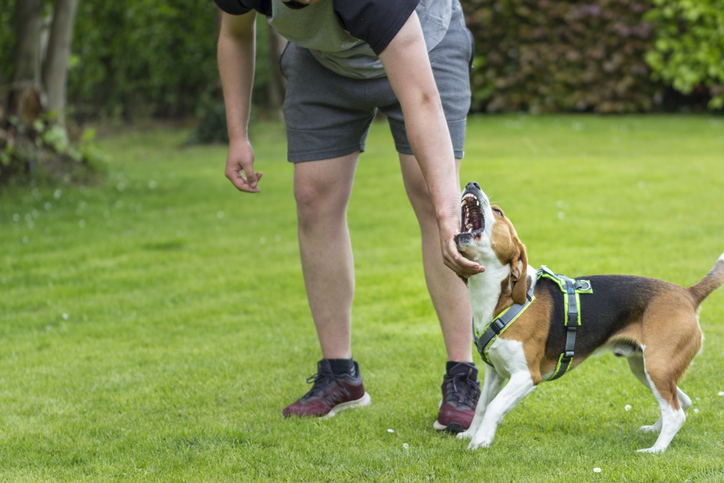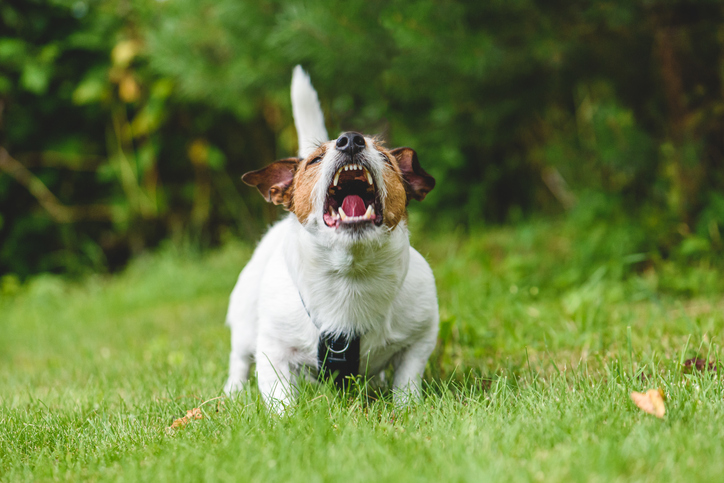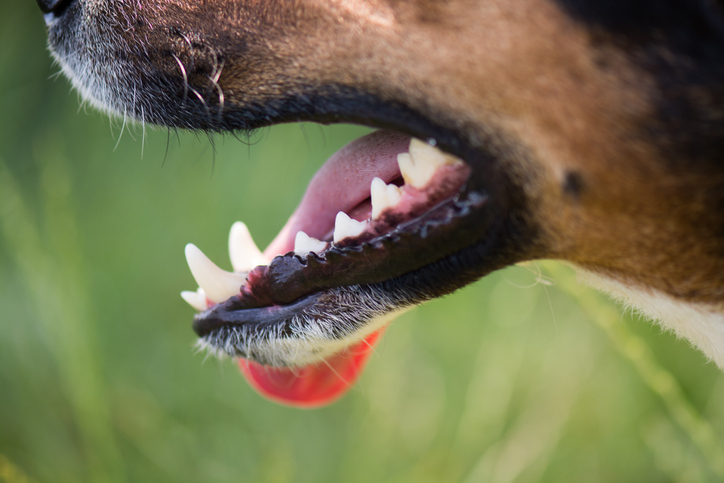
How to deal with an aggressive older dog
8th October, 2021
You’ll probably have spent many happy years with your dog, and feel as though you can accurately predict their behaviour in many different scenarios. However, as dogs get older some owners find their previously calm and friendly pooch becoming more irritable and even becoming aggressive. When you’ve built up such a deep relationship of trust with your four-legged friend this can be very distressing for all concerned. If you’ve started noticing your older dog becoming more aggressive, read our helpful guide on how to cope.
Alongside arranging older dog insurance, there are plenty of things you can do to help them through this testing time. The caring team at Petwise are always here to answer any questions you have about protecting your senior dog. GIve us a call and see how we can help!

Causes of aggression in older dogs
It can be a very scary experience if your normally friendly older dog suddenly becomes aggressive towards other people, dogs or even you! In some extreme cases older dogs have been known to bite or attack even those they know and love. Sometimes for no apparent reason.
Never ignore signs of dog aggression. It can soon get out of hand and result in injury to dogs or people – it can be a sad end to an otherwise faithful dog’s life.
The very first step in dealing with aggression in an older canine is to understand the common causes. That way you’ll be in a much better position to help your older dog overcome this difficult and frightening problem. There are many potential causes of aggression in older dogs, here are some of the most common.
Illness and injury
As dogs age there are several medical conditions that can affect their personality and even cause them to display signs of aggression. If your previously placid pooch suddenly begins growling, snapping, or biting, it may be due to a disease or illness that needs diagnosis and treatment.
Pain caused by an injury or illness can lead to discomfort, stress, and aggression in older dogs. Some possible causes of pain include an injured paw pad, arthritis, hip dysplasia, insect stings, internal injuries and tumours.
Dogs love their food, so if eating seems to be making them grumpy, a dental issue such as tooth decay may be the cause. But it could be something as simple as a piece of food or debris stuck in their teeth.
If your dog suddenly becomes aggressive in the presence of loud noises then an ear infection could be the culprit. Likewise hearing or vision loss can lead to more aggression as they become more easily startled or confused around others. If your dog finds it more difficult to recognise you then problems with aggression become more likely.
Other illnesses may affect your older dog's brain, leading to apparently unreasonable aggression. Distressing conditions such as cognitive dysfunction and brain diseases can also cause aggressive behaviour.
If your older dog suffers an injury as a result of their aggression, then you’ll be pleased they’re covered by older dog insurance through Petwise. It means you can visit your vet without worrying about an expensive bill at the end of it.
Don't be tempted to give medication to your dog or try to take matters into your own hands before getting professional advice. When you don’t know what you're dealing with you could easily make matters worse.
Fear and anxiety
Older dogs can become more fearful and anxious for a whole host of reasons and this can easily develop into aggressive behaviour. Often aggression provoked by fear is only temporary and happens if they feel they’re in danger, cannot escape, and think they need to defend themselves.
However, you still need to find out why your dog behaved in this way, particularly if they haven’t done so in the past. After all, you don’t want this to happen when you least expect it as it could put everyone in danger.
If you’ve adopted an older dog from a charity or rescue centre be aware they might display aggressive or fearful behaviour more than normal. Unfortunately, they may have been abused, neglected, or experienced a traumatic event.
Hopefully the organisation will have made you aware of the situation and any possible triggers. If not, contact them and ask for any information that could help you decide on the best way to deal with the situation.
Also speak to your vet, they might be able to recommend a behaviourist. Or give you suggestions on how to manage your dog's fear on your own. It’s amazing how much you can achieve with a bit of training and patience!
Possessiveness
Older dogs can get very attached to food, toys or other objects that they value – including you! When this happens they can get possessive if another dog or person gets too close.
Dominance
As a dog gets older, they may feel they have to prove they’re still in charge. When other younger dogs start to challenge their dominance it’s a recipe for aggressive behaviour. Unfortunately, humans often mistake the cause of canine aggression as being dominance-related when it’s, in fact, caused by something else.
You know your senior dog better than anyone so always be on the lookout for anxiety, stress, annoyance, pain, or confusion. Pay particular attention to changes around your home or in your routine that may be causing a negative change in the behaviour of your dog.
Whatever the cause, it can be really upsetting if your older dog becomes aggressive. Not only will you become concerned about their quality of life but also about the safety of themselves and others. But don’t despair, there are plenty of steps you can take so the problem doesn’t worsen and lead to further distress or injuries.

Warning signs of older dog aggression
If you’ve spent many years together then you’ll have become used to each other’s body language. So, while they’ll know when somethings up with you, you’ll also know if they’re not feeling themselves. However, while dogs rarely bite without warning, some of the tell-tale signs can be very subtle and sometimes easily missed if you’re not careful.
Subtle early warning signs that your dog is feel anxious or uncomfortable include:
- Yawning, blinking or licking their lips.
- Turning their body or head away from you.
- Showing the whites of their eyes.
- Having a stiff or tense body.
- Lowering their body.
- Tucking their tail under themselves.
- Lifting their front paw up.
- Walking away.
More obvious signs of aggression include:
- Lifting their lips and baring their teeth.
- Staring intently.
- Raised fur.
- Growling and snapping and eventually a bite.
If your dog is showing any of these signs, remember the following:
- Stop whatever it is you’re doing. You might be causing the aggression without even knowing it.
- Keep calm and speak softly to them.
- Move slowly, smoothly and calmly and try to remove them from the situation.
- Don’t stare at the dog, stand over it or punish it for showing these signs.
- Never force a dog into a situation that’s making them afraid. This could lead to an escalation in aggression and even injury.
Preventing aggression in older dogs
It’s much better for your older dog if you put a stop to aggression before it starts. Just like getting older dog insurance, being well prepared for behavioural changes is vital to a long and happy life. If you notice any changes in your older dogs, such as a sudden change in aggression levels, do the following.
- Take them to the vet as soon as possible
Delay will not help as aggression tends to get worse over time and can lead to serious injuries and upset. There are many potential medical reasons for aggression in older dogs that need to be ruled out. From arthritis to cognitive dysfunction there’s a lot your vet can help with. And even if there isn’t a medical reason, your vet will be able to recommend an animal behaviourist to help your older dog learn to cope. - Keep a record of triggers
Knowing when your dog behaves aggressively could be a helpful first step in discovering its cause. If your older dog only acts aggressively in certain situations then it might be possible to avoid these triggers and stop your dog’s aggression getting worse. Discussing these triggers with your vet could lead to a key breakthrough in their treatment. - Take note of any other symptoms
Matters such as hair loss, vomiting, diarrhoea, loss of appetite, and lethargy, all need to be shared with your vet. - Provide them with a safe space
Creating a less stressful environment where an older dog can feel safe and in control of their environment is important. Something as simple as providing a dog bed in a quieter corner could be the answer. - Prepare your older dog for household changes
Welcoming a new baby, moving house or even DIY changes can all worry your older dog. Try to minimise stress by preparing them for these changes as far as you can. - Have a distraction close at hand
Particularly if your dog is becoming aggressive towards other dogs, it might be best to avoid them as much as possible. Perhaps walk them at times or in places when you know there won’t be other dogs around. If you can’t avoid other dogs then keep them on a lead and have a distraction with you. Something they really like, such as a favourite treat or toy, can give you vital time to get away from the triggering event. - Look for patterns in how your dog reacts
For example, are they only ever aggressive in a certain room? Is it only when you try to brush them or trim their nails? How do they act around certain groups of people (such as children)? Try to avoid these situations or ask a professional how to handle them. - Use calming techniques such as positive reinforcement
Here you reward a dog’s good behavior and focus on being positive around them. Whenever your older dog avoids getting aggressive, make sure you reward them with a treat and praise. - Avoid escalating the situation
If your dog is acting aggressively, never force them to confront the thing they’re reacting to or by punishing or shouting at them. This can soon make matters a whole lot worse for both you and your dog. If the situation keeps happening, they might react more and more strongly each time. Eventually even the most loving of dogs can bite if they’re pushed too far. This is when you may have to call on your older dog insurance if they need emergency treatment. - Be careful around children
It’s important to never leave children alone with your older dog, particularly if they have a history of aggressive or anxious behaviour. Unfortunately, children may not understand the subtle signals your dog is giving and can act in ways your dog finds unpredictable and scary.
Protect your senior dog with Petwise today
It takes a lot of love, time and effort to come up with a long-lasting solution to common behavioural problems such as aggression in senior dogs. And as the years go by, providing the very best level of care for your senior dog can often get harder. That’s why the caring team at Petwise have ensured there’s no upper joining age limit for taking out insurance cover with us.
Petwise can now offer a choice of seven cover levels for older dog insurance to suit all budgets and canine care needs. Dental cover is also included as standard on all policies, and there’s even a contribution towards specialist senior pet food, too.
If you ever need to make a claim, our friendly UK-based team is always there to help provide a solution. And when your dog reaches the end of their happy life we also provide a bereavement helpline and farewell cover to help you through it.
Finding older dog insurance is straightforward with Petwise – get a quick quote today.
Policy benefits, features and discounts offered may very between insurance schemes or cover selected and are subject to underwriting criteria. Information contained within this article is accurate at the time of publishing but may be subject to change.